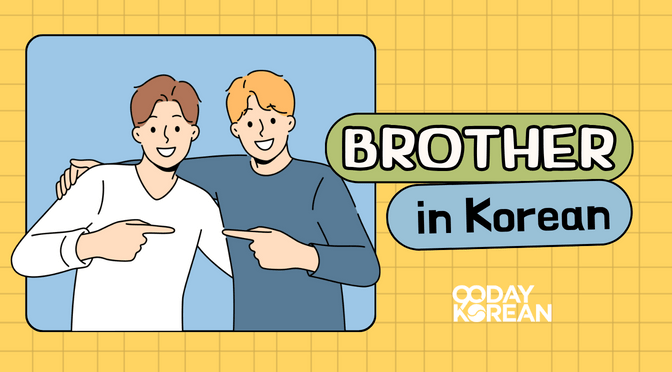Today, we wanted to take a deeper dive into the word for “brother” in Korean.
There are more Korean terms related to “brother” than you think, and we’ll go over each of them in this article.
If you have a male sibling or you know someone who is a brother, you’ll find learning this new vocabulary useful. Here we go!
Contents
How to say “brother” in Korean
First of all, you need to understand that there is a difference depending on if you are a female or a male speaker.
If you are a female speaker, the word to use for big brother is 오빠 (oppa). But if you are a male speaker, the word for older brother is 형 (hyeong). However, the word for younger brother 남동생 (namdongsaeng) can be used by both genders. So, what determines which word you will use?
Sample sentence:
우리 오빠를 벌써 만났어요? (uri oppareul beolsseo mannasseoyo?)
Did you already meet my brother?
Now, what if you want to get formal with this word? The formal way to use this word, if you are male, is to call out your older brother with 형님 (hyeongnim). And, if you are female, you would call out your older brother with 오라버니 (orabeoni). These words are rarely used in everyday conversations, but you may hear them occasionally in drama or movies.
Below, we will go over some related words. This will also help you understand the point made in the above paragraph.
“Younger brother” in Korean
The word for “younger brother” in the Korean language is 남동생 (namdongsaeng). As you may notice, in this case, it doesn’t matter if the speaker is male or female. The word remains the same.
The word 동생 (dongsaeng) expresses younger sibling, while 남 (nam) designates it as a boy. The word 동생 (dongsaeng) can be also used for a younger person that you are very close to, even if you are not related to.
If you are talking to your younger brother directly, you may choose to use their name instead, though the word 동생 (dongsaeng) is also not incorrect. Most Koreans use their younger brother’s name when calling them directly. The words 동생 (dongsaeng) or 남동생 (namdongsaeng) are usually for when talking about one’s younger brother to someone else.
Sample sentence:
내 남동생이 미국으로 유학을 갈 때가 그리울 거야. (nae namdongsaengi migugeuro yuhageul gal ttaega geuriul geoya.)
I will miss my little brother when he goes to study in the United States.
“Older brother” in Korean
Based on the above, you can perhaps already guess that the word for “older brother” in Korean is 오빠 (oppa) when the speaker is female and 형 (hyeong) when the speaker is male. You can use it with people who are not related to you, as well.
Indeed, it is also common for men to call male friends older than them 형 (hyeong), while women call male friends older than them 오빠 (oppa). It is also not uncommon for women to call their significant others 오빠 (oppa), although other terms of endearment exist for that, as well.
“Stepbrother” in Korean
For stepbrother, too, there are a few different words you can use. If they are older than you and you are male, you may use 의붓형 (uibutyeong). If they are older than you and you are female, you may use 의붓오빠 (uibudoppa). If they are younger than you, you may use 의붓동생 (uibutdongsaeng), regardless of gender.
Sample sentence:
일 년에 한 번씩 의붓오빠를 방문한다. (il nyeone han beonssik uibut oppareul bangmunhanda.)
I visit my stepbrother once a year.
“Half-brother” in Korean
If they are older than you and you are male, you may use 이복형 (ibokyeong). If they are older than you and you are female, you may use 이복오빠 (ibokoppa). If they are younger than you, you may use 이복동생 (ibokdongsaeng), regardless of gender.
Sample sentence:
이 사람은 제 이복동생이에요 (i sarameun je ibokdongsaengieyo.)
This person is my half-brother.
“Brothers” in Korean
Now, if you want to speak of more than one brother at a time, the word to use is 형제 (hyeongje).
“Brother-in-law” in Korean
Now, here is where it gets a little more complicated. But we will try to make it as simple as possible! In short, there are 11 different words for brother-in-law in Korean, based on age, gender, and even marital status.
| English meaning | Korean |
|---|---|
| Husband's older brother | 아주버님 (ajubeonim) |
| Husband's older brother | 형님 (hyeongnim) |
| Husband's younger brother | 시동생 (sidongsaeng) |
| Husband's married younger brother | 서방님 (seobangnim) |
| Husband's unmarried younger brother | 도련님 (doreyonnim) |
| Wife's older brother | 형님 (hyeongnim) |
| Wife's younger brother | 처남 (cheonam) |
| Older sister's husband (for men) | 매형 (maehyeong) |
| Older sister's husband (for women) | 형부 (hyeongbu) |
| Younger sister's husband (for men) | 매제 (maeje) |
| Younger sister's husband (for women) | 제부 (jebu) |
Sample sentence:
오늘은 처남과 저녁을 먹어. (oneureun cheonamgwa jeonyeogeul meogeo.)
Today, I have dinner with my brother-in-law.
Wrap Up
And there you go, we have finished learning how to say brother in Korean! Were you surprised to find out there were so many different words to know for it? For more similar content, read our article on 형 (hyeong), 언니 (eonni), 선배 (seonbae) and so on!
And if you’d like to know the terms for other immediate family members, like your older and younger siblings, parents, and grandparents, head on to our article on Korean Family Terms!




